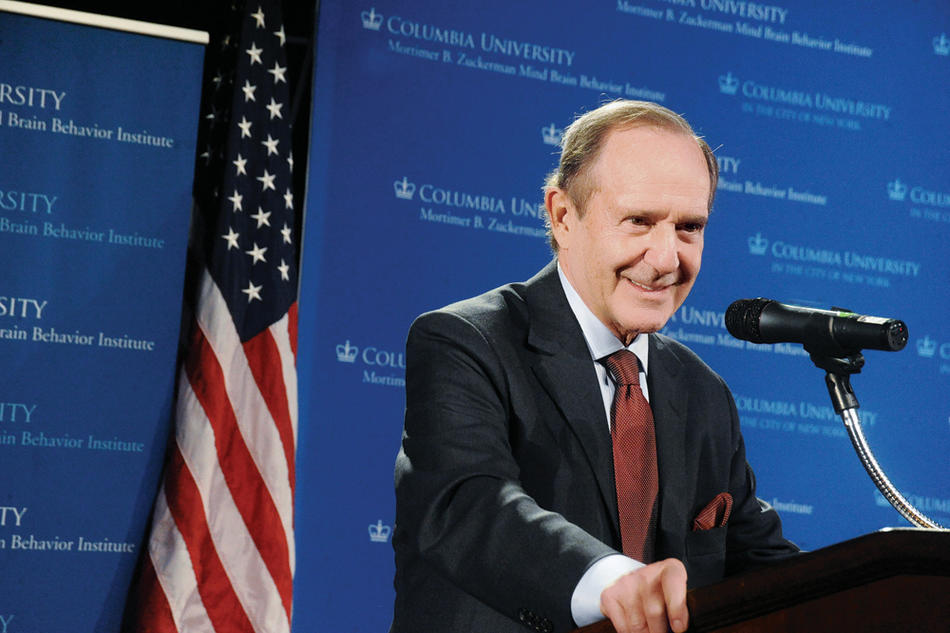Mortimer B. Zuckerman, a real-estate developer who is the founder of Boston Properties, the publisher of New York City’s Daily News, and the chairman and editor in chief of U.S. News & World Report, has given Columbia one of the largest gifts in its history: $200 million to endow and name the Mortimer B. Zuckerman Mind Brain Behavior Institute.
The institute, which will be based at the Jerome L. Greene Science Center, a 450,000-square-foot building scheduled to open in 2016 on the new Manhattanville campus, has been years in the planning. It will bring together neuroscientists and researchers from a wide range of fields to study how brain mechanisms underlie high-level functions such as memory, self-awareness, language, and emotion. One of its goals is to achieve a greater understanding of neurological disorders in hopes of developing new therapies.
“Mort Zuckerman shares with Columbia University the belief that acquiring a greater understanding of the brain and the mind will unlock solutions to a vast array of human problems,” wrote President Lee C. Bollinger in a statement announcing the gift on December 17. “Moreover, he believes that to gain these profound insights about human behavior, we must assemble a team of great scholars and scientists ... On behalf of the University, I want to express our gratitude to Mort Zuckerman for this historic gift and also acknowledge the profound responsibility we have to marshal these resources to expand our knowledge of the mind, brain, and human behavior.”
Zuckerman, a Canadian-born businessman educated at McGill, Penn’s Wharton business school, and Harvard Law, earned his fortune developing large, elegantly designed properties in cities across the US as the founder of Boston Properties. An outspoken political commentator, Zuckerman writes columns for the Daily News and U.S. News & World Report and appears regularly on The McLaughlin Group.
At a forum on neuroscience held to celebrate his gift in Low Library on December 17, Zuckerman described how visiting the laboratory of Eric Kandel, a Nobel-laureate neuroscientist at Columbia, inspired him.
“Eric Kandel is the visionary who convinced me that we stand at the edge of a new era of understanding of the human mind,” said Zuckerman. “He explained that for the first time we have the technology to measure extensively the real effects of drugs and treatment on the brain that would dramatically increase our capacity to deal with that very complicated part of our anatomy ... Who could not be motivated by the potential benefits to this field of scientific research?”
The plans for the effort that now bears Zuckerman’s name were first announced in 2006, when Columbia received another landmark gift — from the late Dawn Greene and the Jerome L. Greene Foundation — to create a building that would serve as its physical hub. The Jerome L. Greene Science Center, designed by renowned Italian architect Renzo Piano, is now under construction.
At the December 17 forum, which was attended by New York City Mayor Michael Bloomberg and hundreds of faculty, students, and reporters, the Zuckerman Institute’s founding codirectors — Kandel and fellow neuroscientists Richard Axel, who is also a Nobel laureate, and Thomas Jessell, a Kavli Prize winner — joined a panel discussion about the future of neuroscience at Columbia. The range of intellectual perspectives among the panelists demonstrated the institute’s multidisciplinary nature. The other participants were Geraldine Downey, a psychology professor who studies personality disorders; Kenneth Forde, a professor emeritus of clinical surgery and a University Trustee; Elizabeth Hillman, an associate professor of biomedical engineering and of radiology; and David H. Strauss, the deputy director for research at the New York State Psychiatric Institute and a vice chair of Columbia’s Department of Psychiatry.
“The universal challenge for the twenty-first century is to understand the mind and its disorders in biological terms,” said Kandel. “But in a larger sense we not only want to understand the nature of the human mind and its diseases, but to also ask a range of questions that link brain science to other areas of knowledge . . . These are the sorts of things that I hope the Mortimer B. Zuckerman Mind Brain Behavior Institute will try to accomplish in the twenty-first century, and this is what we owe to Mort’s prophetic vision.”



